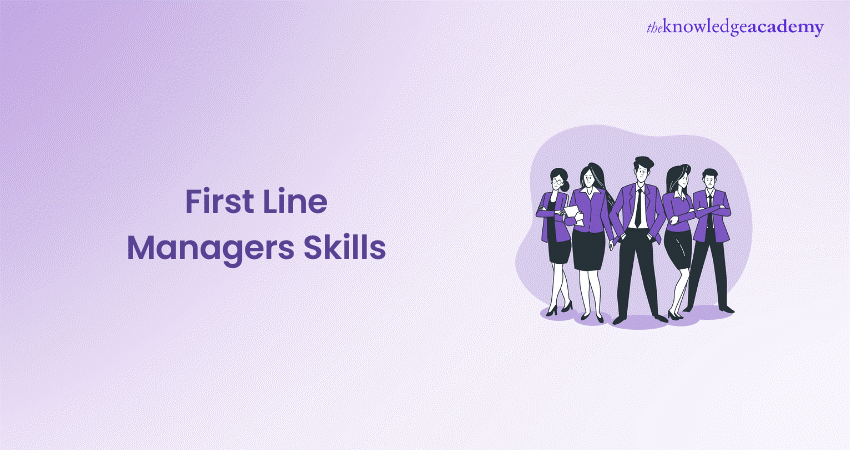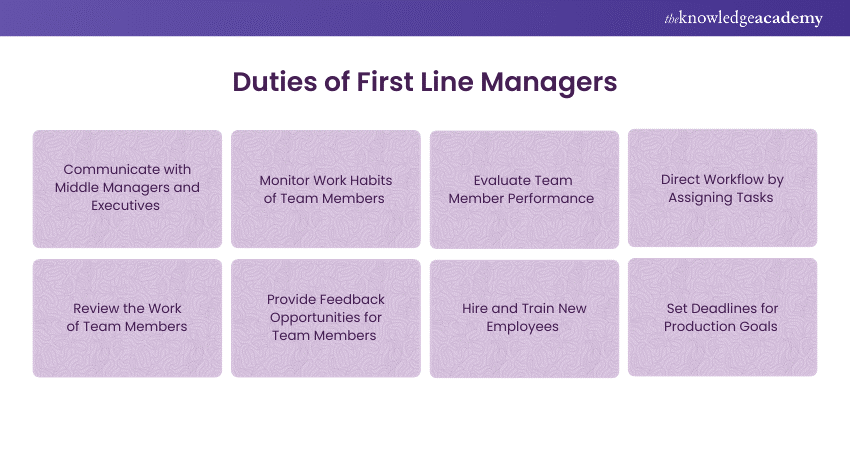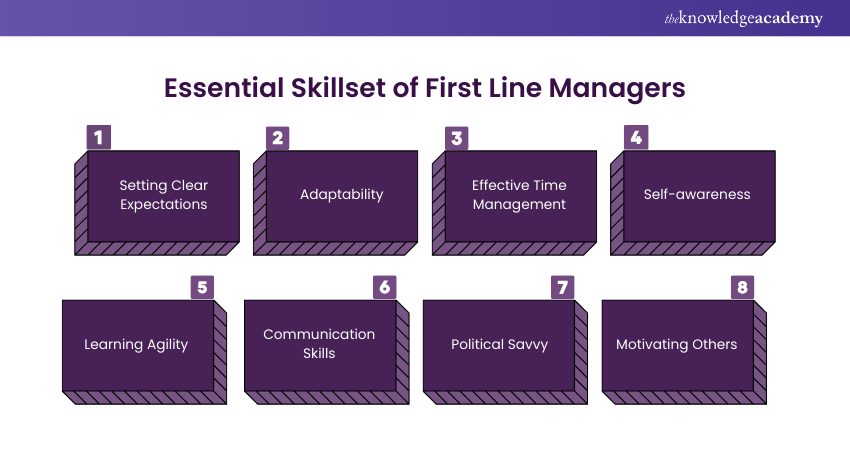We may not have the course you’re looking for. If you enquire or give us a call on + 1-866 272 8822 and speak to our training experts, we may still be able to help with your training requirements.
We ensure quality, budget-alignment, and timely delivery by our expert instructors.

Picture this: the high-stakes roller-coaster of organizational goals, where twists and turns can leave even the most seasoned professionals feeling dizzy. But fear not! Enter the unsung heroes—the First Line Managers. These managers are the glue that binds strategy to execution, bridging the gap between lofty visions and practical teamwork. They’re the ones who turn abstract plans into tangible results, all while keeping the collaborative spirit alive.
As foundational pillars of an organisation’s goals, First Line Managers connect leadership's strategic vision with their team’s practical contributions by leading and unifying everyone involved. First Line Managers Skills are essential in bridging the layers of a business resulting in effective collaboration and peak performance. According to a study, by 2022, an estimated 10 million people were working as Line Managers in the UK.
This blog explores the most important First Line Manager Skills needed for an aspiring manager to thrive in the role and achieve organisational excellence.
Table of Contents
1) What is a First Line Manager?
2) What do First Line Managers do?
3) First Line Manager Skills
4) How to Become a First Line Manager?
5) Conclusion
What is a First Line Manager?
A First Line Manager, often referred to as an office manager, supervisor, shift manager, or team leader, holds an entry-level managerial position. Their primary responsibility is the day-to-day supervision of non-management employees, serving as the main point of contact for staff members who are not in management roles.
These managers play a crucial role in maintaining the smooth operation of frontline activities within an organisation. They focus on ensuring their teams remain productive and on task, which is vital for the overall success and efficiency of the business.
What do First Line Managers do?

First Line Managers primarily responsibility involves overseeing a team or department of employees and ensuring that their team fulfils an organisation's daily and overarching goals.
Since First Line Managers typically work closely with team members, they are deeply connected to organisational operations and understand how to motivate them effectively. Depending on the organisation they work for, First Line Managers can be responsible for any of the following duties:
a) Communicating with Middle Managers and Executives
b) Monitoring the work habits of team members
c) Evaluating team member performance
d) Directing workflow by assigning tasks
e) Reviewing the work of team members
f) Providing feedback opportunities for team members
g) Hiring and training new employees
h) Setting deadlines for production goals
Fulfil your managerial aspirations with our Management Training for New Managers Course. Sign up now!
First Line Manager Skills
The First Line Manager Skills set needs to be all-encompassing in the context of an organisational goal. This includes everything from the ability to train new employees to analysing budgets for projects. Here are some of the essential First Line Managers Skills:

Setting Clear Expectations
Without clearly set expectations, employees may be left to wonder where their impact lies and, therefore, fall behind. An important responsibility of a First Line Manager is to set clear expectations for those working below them. Here are some helpful ways to set expectations:
a) Focus on objectives: Line Managers must regularly discuss and review progress to ensure that employees and managers are on the same page.
b) Set timely expectations: Line Managers must ensure clear, realistic deadlines to ensure that employees are not feeling overwhelmed.
c) Provide positive, constructive feedback: This helps managers impart guidance and employees stay motivated.
d) Hold employees accountable: Line Managers must follow up, establish shared goals, and set milestones to gauge progress.
Eager to take the next step as assistant manager, refer to our blog on "Assistant Manager Job Description"
Adaptability
In today's world, where situations, people and work environments can change fast, managers who can adapt are better equipped to handle obstacles. Adaptability as a First Line Manager is about flexibility and involves key skills such as:
a) Cognitive adaptability: First Line Managers should be able to hold multiple scenarios in mind and switch between tasks efficiently.
b) Emotional adaptability: They should manage emotional responses well and be comfortable with transitions, complaints, and conflicts.
c) Personality adaptability: They must see situations for what they are and what they could become, thinking holistically, and acting according to different circumstances without changing one's core self.
Secure your future as a successful Front Line Manager with ours CMI Level 3 Award In First Line Management Course. Sign up now!
Effective Time Management
Meeting deadlines is an important part of organisational success. This is where the time-management skills of First Line Managers become vital. Here are some effective time-management techniques to consider:
a) Break tasks into smaller chunks: Large tasks can be overwhelming for most people. Smaller chunks make it easier to start and complete projects.
b) Effective delegation: Line Managers should be able to utilise the team's skills to save time, build trust, and empower members.
c) Eliminate distractions: Be it working in quiet areas, switching off devices, or using earphones to stay focused, Line Managers should ensure that distractions are eliminated.
d) Write a plan or to-do list: A written list clears the mind, creates flow, and keeps the team members motivated.
e) Utilise your calendar and time block: Blocking time periods in a calendar increases productivity. Line Managers should oversee this whether they use Outlook, Google or a manual calendar.
Eager in taking the next step to be an assistant manager, refer to our blog on "Assistant Manager Salary"
Self-Awareness
Self-aware First Line Managers who understand their strengths and preferences, as well as their weaknesses and development needs, are better equipped for decision-making and interpersonal interactions. Here are some key points to consider:
a) Recognise Strengths and Preferences: Line Managers should identify and leverage personal strengths in daily tasks and align tasks with their natural preferences for optimal performance.
b) Understand Weaknesses and Quirks: Line Managers must acknowledge areas needing improvement and be aware of personal quirks that may affect interactions and decisions.
c) Identify Development Needs: Great Line Managers continuously seek opportunities for personal and professional growth and engage in training and development programs to address skill gaps.
Learning Agility
Frontline managers who seek out diverse experiences, apply lessons quickly, and adapt to their environment are better equipped to recognise, analyse, and address new problems. Here are key strategies:
a) Seek Out Diverse Experiences: First Line Managers should engage in varied roles and projects to broaden perspectives and work with different teams and departments to gain new insights.
b) Apply Lessons Learned Quickly: Line Managers must reflect on past experiences to identify key takeaways and be able to implement learned strategies and techniques in new situations promptly.
c) Integrate Experiences: Effective First Line Management involves combining knowledge from different experiences to form holistic solutions. They must be able to use a blend of interpersonal, technical and strategic skills to address issues.
Envisioning yourself as a powerful First Line Manager? Sign up for our CMI Level 3 Certificate In First Line Management Training now!
Communication Skills
Skilled First Line Managers excel in listening, speaking, and writing clearly and consistently. This helps ensure effective communication at all levels of the organisation. Here are some key strategies for maximising communication impact:
a) Active Listening: Line Managers must give full attention to the speaker without interrupting and show empathy and understanding by nodding and providing verbal affirmations.
b) Clear and Consistent Speaking: Line Managers should use simple and direct language to convey messages while maintaining a confident and calm tone to instil trust and authority.
c) Effective Writing: Line Managers must be able to write concise and clear emails, reports, and memos. Using bullet points and headings is a great way to enhance readability.
Political Savvy
Line Managers should develop a politically savvy side to bolster their authority in a tactful and diplomatic way. Here are some key points to consider:
a) Build Rapport: Line Managers must engage in regular, informal conversations to strengthen relationships and demonstrate genuine interest in the personal and professional lives of team members.
b) Identify Key Stakeholders: Line Managers should be able to map out individuals and groups with a vested interest in their projects and objectives. They should keep stakeholders informed about progress, challenges, and achievements.
c) Understand Informal Networks: Line Managers must be aware of the informal relationships and power dynamics within the organisation. They should identify key influencers and decision-makers who can support the initiatives.
d) Use Diplomacy and Tact: First Line Managers should approach sensitive issues with care and consideration and build alliances and negotiate effectively to gain the necessary support for your goals.
Motivating Others
Motivating teams both during project execution and after project completion is very important. Consider these points:
a) Inspire Commitment: Line Managers must nurture a sense of purpose and dedication within the team and communicate a compelling vision that motivates team members to commit to organisational goals.
b) Recognise and Reward Contributions: Acknowledging individual and team achievements regularly is very important. Line Managers must provide praise and appreciation to boost morale and encourage continued effort.
c) Guide Direct Reports: Line Managers must provide clear direction, resources and support, especially when goals are ambiguous.
d) Motivate Beyond Monetary Incentives: Line Managers should encourage team members to exceed expectations and put in extra effort beyond mere monetary incentives.
How to become a First Line Manager?
While the steps for becoming a First Line Manager will differ depending on your industry, you can take a few initiatives to help you accomplish this goal. To convince your employer that you should move up from your current role into a managerial position, consider following these steps:
a) Achieve and Excel: To demonstrate your initiative and competence, consistently meet and surpass organisational goals. Focus on soft skills like time management and communication.
b) Share Your Goals: Express your managerial aspirations to your employer as clearly as possible to ensure they are aware of your career goals. This helps others consider you in a leadership role.
c) Teach and Lead: Leverage your current role to demonstrate leadership and teaching abilities. This increases the likelihood that your employer will consider you for managerial positions.
d) Collaborate to Improve: Encourage excellent collaboration within your team to boost productivity and showcase your commitment to growth. This increases your potential as a First Line Manager.
e) Never Stop Learning: Seek advice from successful managers. This way you can stay adaptable and showcase your growth-oriented nature.
Prepare for your next interview by practicing office manager interview questions. Stand out as the perfect candidate with confidence and clarity.
Conclusion
Mastering First Line Managers Skills is essential for effective, conflict-free team leadership and sustained operational success. By focusing on communication, collaboration, and continuous learning, you can enhance your First Line Managers Skills, driving both personal growth and organisational excellence. We hope this blog helps you embolden your skills towards becoming a proficient and respected First Line Manager.
Looking to harness your potential as a Line Manager? Our CMI Level 3 Diploma In First Line Management Training is here to help. Sign up now!
Frequently Asked Questions

Operations managers typically supervise First Line Managers. They oversee the work of First Line Managers, who in turn supervise non-managerial employees

First Line Managers make decisions related to work habits and performances of team members, hiring and training new employees, directing workflow by assigning tasks and setting deadlines for production goals.

The Knowledge Academy takes global learning to new heights, offering over 30,000 online courses across 490+ locations in 220 countries. This expansive reach ensures accessibility and convenience for learners worldwide.
Alongside our diverse Online Course Catalogue, encompassing 17 major categories, we go the extra mile by providing a plethora of free educational Online Resources like News updates, Blogs, videos, webinars, and interview questions. Tailoring learning experiences further, professionals can maximise value with customisable Course Bundles of TKA.

The Knowledge Academy’s Knowledge Pass, a prepaid voucher, adds another layer of flexibility, allowing course bookings over a 12-month period. Join us on a journey where education knows no bounds.

The Knowledge Academy offers CMI Level 3 Training, including the CMI Level 3 Award in Principles of Management and Leadership Training Course and CMI Level 3 Award in First Line Management Training. These courses cater to different skill levels, providing comprehensive insights into Management Styles.
Our ILM, CMI Leadership & Management Blogs cover a range of topics related to Line Managers, offering valuable resources, best practices, and industry insights. Whether you are an aspiring manager or looking to advance your Management Skills, The Knowledge Academy's diverse courses and informative blogs have got you covered.
Upcoming ILM, CMI Leadership & Management Resources Batches & Dates
Date
 CMI Level 3 Certificate in First Line Management Training Course
CMI Level 3 Certificate in First Line Management Training Course
Thu 6th Mar 2025
Thu 22nd May 2025
Thu 24th Jul 2025
Thu 4th Sep 2025
Thu 20th Nov 2025
Thu 11th Dec 2025







 Top Rated Course
Top Rated Course



 If you wish to make any changes to your course, please
If you wish to make any changes to your course, please


